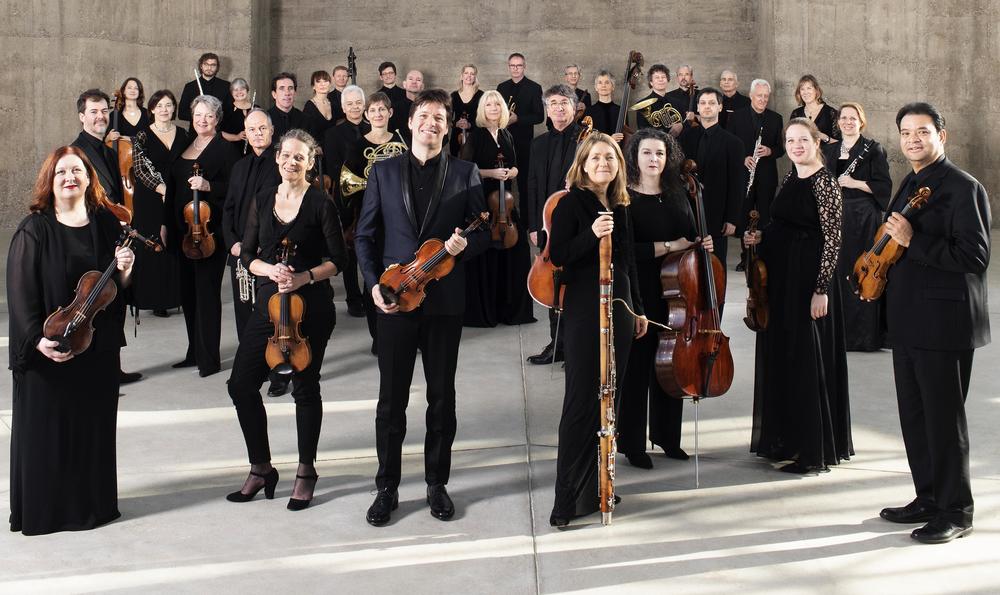
Caption
Violinist Joshua Bell, third from front left, and the Academy of St. Martin in the Fields chamber orchestra will perform in Columbus as a part of their first post-COVID pandemic tour.
Credit: Benjamin Ealovega
Since 2011, American violinist Joshua Bell has also been music director of the London-based Academy of St. Martin in the Fields, whose first pandemic-era U.S. tour together kicks off Feb. 22 in Columbus, Georgia.

Violinist Joshua Bell, third from front left, and the Academy of St. Martin in the Fields chamber orchestra will perform in Columbus as a part of their first post-COVID pandemic tour.
Since 2011, American violinist Joshua Bell has also been music director of the London-based Academy of St. Martin in the Fields, whose first pandemic-era U.S. tour together kicks off Feb. 22 in Columbus, Georgia.
Joshua Bell joined GPB’s Sarah Zaslaw to talk about the visceral energy between him and the orchestra, the silver linings of the pandemic pause and getting his kids to practice.
About the group’s umpteen recordings with founder Sir Neville Marriner
The Academy is very famous for its — you said umpteen recordings — ump-hundred or ump-thousand recordings. I remember growing up as a kid, every other recording on my NPR station seemed to be the Academy of St. Martin in the Fields.
On resuming touring
I look forward to my tours with them more than anything else. The last thing I did before the pandemic was a huge U.S. tour, and that ended literally the day, the week, that the country shut down. So now I'm so excited to get back on the road with them.
On leading a conductorless orchestra
I started coming to them occasionally as a guest artist, and we would do, at first, things like Vivaldi’s Four Seasons and Bach concertos, where it's easily led by the soloist. And then, little by little, I started doing a little bit more, you know: a Mozart symphony and directing it from the concertmaster chair. So it kind of grew.
Also, it's kind of breathed new life into the concertos I've done all my life. I love conductors, but when you direct it and conduct and play yourself, it becomes a lot more like chamber music.
I think for anyone coming to hear the Eroica — the third symphony of Beethoven — done this way, without someone with a stick in front of the orchestra and just being led from me and the concertmaster chair, it's a different kind of experience; very visceral. Every player has to sit on the edge of their seat and be involved in a way you don't always see in a traditional, conductor-led orchestra.
It's kind of remarkable, when the orchestra knows you well, how much you can convey by the way you use your body, the way you use your bow. They can interpret that as what kind of sound I want. It’s something that we've developed in a way, our own language together.
On pandemic silver linings
Part of me was relieved, because I just needed a break. It was a much-needed rest, and gave me time to spend with my family and my kids and play basketball, and drink coffee every morning, which I don't do on concert days. I hadn't had time since I was a teenager, really.
And also, musically, going into the practice room and living with music in a different way. It wasn't to prepare for the concert the next day. It was just to discover things and to reevaluate everything I'm doing. It’s made me think even in the future, you know, not to wait for a pandemic to take more time off.
My wife, Larisa Martinez, is a wonderful soprano, and we conceived of a voice and violin program together. That came out of out of that time off as well.
On music in his sons’ lives and not applying too much pressure
They play cello and violin and piano. I seem to be keeping the pressure off because they don't practice! They know that music is important. They do enjoy music. They don't always want to practice. It is an issue, especially in the digital age: it's tough with their screens and things. But I did make it clear that music is part of life, it’s a part of being a human being, to know and play music on some level and to have it in their lives, and they understand that.